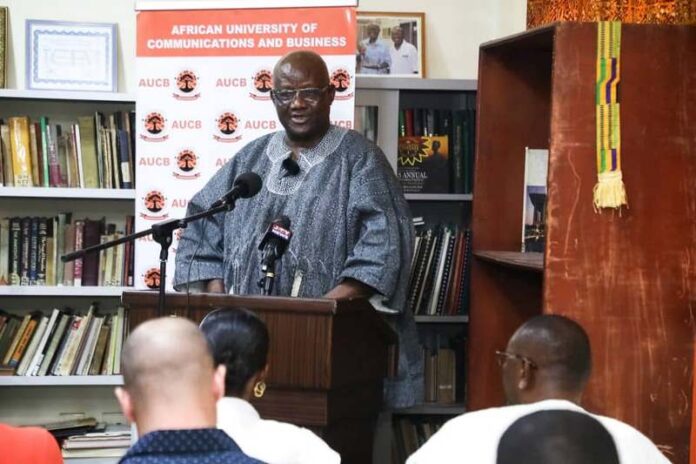Former National Chairman of the New Patriotic Party (NPP), Awentami Paul Afoko, has underscored the importance of civic courage in safeguarding Ghana’s democracy, stressing that national ideals of freedom and justice can only be upheld when citizens, particularly the youth, find the boldness to defend them.
He delivered this message during a public lecture on Friday, November 21, 2025, at the African University of Communication and Business, held on the theme: “Civic Courage: Speaking Up, Standing Out, and Making a National Impact.”
According to Mr Afoko, Ghana has reached a point in its democratic journey where courage is indispensable.
He noted that while the Constitution guarantees freedom and justice, “these ideals depend on its citizens, especially the young people, who are bold enough to defend them.”
Mr Afoko stressed that democracy is not self-sustaining, explaining that it is protected daily by individuals willing to question authority and act with integrity. “Democracy doesn’t sustain itself. It’s protected daily by courageous voices willing to speak, question, challenge, and uphold integrity,” he said.
Referencing celebrated writer Ama Ata Aidoo, he reminded the audience that “true courage is not the absence of fear, but the presence of conviction.”
He described civic courage as the willingness to defend principles even at personal risk, emphasising that it is non-partisan and serves as the moral fibre that holds a nation together. He added that throughout history, courageous leaders are remembered not for their loudness but for their principled stance.
Recounting his own ordeal
Mr Afoko recalled the personal cost of speaking truth to power during Ghana’s political turbulence in the early 1980s.
“In 1981, after the 31st December coup d’etat, I publicly challenged the motives of the coup plotters. I insisted that power should be returned to the democratically elected president, Dr Hilla Limann.”
That decision, he said, came with heavy consequences. “That single act of speaking up led to my arrest and detention without trial.”
He continued, “For a long stretch, I found myself behind bars, not because I had broken any law, but because I refused to break my conscience.”
Mr Afoko recounted that he eventually escaped detention and spent nearly two decades in exile—unable to return home due to the tense political climate. His experience, he said, illustrates how expensive courage can be, but also how much more costly silence becomes.
‘Ghana cannot transform through compromised principles’
Addressing the audience, he cautioned that the country cannot progress if citizens sacrifice their values for convenience. “Ghana will not be transformed by people who fold their principles to fit in,” he said.
He lamented how corruption has become normalised, mediocrity accepted, and truth increasingly perceived as dangerous.
Many people, he noted, mistakenly believe that national impact requires high office. He argued instead that impact is not measured by titles or positions but by the courage to shape history rather than allow history to shape citizens.
Practical strategies for ethical leadership
Mr Afoko outlined five key strategies to help young leaders cultivate ethical and courageous leadership:
- Develop an informed voice by reading widely.
- Separate partisanship from patriotism, ensuring love of country outweighs loyalty to party.
- Hold leaders accountable respectfully.
- Build credibility through consistency.
- Use your voice responsibly, speaking to build rather than destroy.
He concluded by emphasising that the survival of democracy does not rest solely on a handful of leaders. “Democracy survives not because a few leaders are courageous but because millions of citizens refuse to surrender their responsibility,” he said.
ALSO READ:
Extend ORAL’s mandate to expose more corrupt deals – Mahama urged
Seven fire tenders battle huge fire outbreak at Weija Junction



